
Although not a lot is known about Scott Joplin, the author does an amazing job of piecing together his story, and the author’s note and bibliography make this an excellent research resource.Ĭons: I can’t stop humming “Maple Leaf Rag”. Pros: There’s a folksy feel to both the voice and the illustrations of this picture book biography that draws the reader in immediately. The stories focus as much on the talent as the. Its success allowed him to leave saloons forever and focus on composing, creating “an American music like the country itself–a patchwork of sounds and colors.” Includes a lengthy author’s note with additional information, a bibliography, and a recommended listening list. A detailed history of black songwriters from vaudeville and early Broadway shows to the stars of the 1930s. His love of a new form of music, ragtime, led to his most famous composition, “The Maple Leaf Rag”. But the pull of music was too great, and Scott started playing in saloons, gradually working his way up to more respectable establishments and a chance to go to college. When Scott was old enough, though, his father told him he should get a job on the railroad, one of the only opportunities for a young African American man to find steady work. His parents encouraged his talents by buying him a piano, not an easy feat for the impoverished family, and got him lessons when his mother offered to clean the music teacher’s house. It is based on the 1975 novel of the same name by E.L. As one of the few surviving musicians from the Ragtime era, Blake became a beloved celebrity and torchbearer for the music.Summary: Scott Joplin grew up in a musical family in Texarkana, Arkansas. Ragtime is a musical with music by Stephen Flaherty, lyrics by Lynn Ahrens, and a book by Terrence McNally. The release of The Eighty-Six Years of Eubie Blake gave Blake’s career a second wind.


He collaborated with Noble Sissle on the Broadway musical Shuffle Along (1921), which renewed the popularity of Black musical comedies and launched the careers of many Black actors including Josephine Baker, Florence Mills, and Paul Robeson. Prior to this double-LP, Blake had a successful career as a songwriter with hits such as Charleston Rag (1899), I’m Just Wild About Harry (1921), and Memories of You (1930). Doctorow chapter summaries, themes, characters, analysis, and quotes Brush up on the details in this novel, in a voice that wont put you to sleep. In 1969, Columbia Records released The Eighty-Six Years of Eubie Blake.

There are several important projects that contributed to the Ragtime revival of the 1970s, several of which will be outlined here. Doctorow's distinguished novel, Ragtime was the winner of the 1998 Tony Awards for Best Score, Book and Orchestrations, and both the Drama Desk and Outer Critics Circle Awards for Best Musical and Best Score. However, the most impactful Ragtime revival occurred in the 1970s, the events of this time truly securing the art form’s place in the United States culture. Written by the award-winning composer/lyricist team of Stephen Flaherty and Lynn Ahrens (Once on This Island, Seussical, Lucky Stiff), noted playwright Terrence McNally, and based on E.L. 1950 was also the year in which scholars Rudi Blesh and Harriet Janis published their seminal history book entitled They All Played Ragtime.

known today mostly as a style of piano music, but in the late 19th & early 20th centuries the term also encompassed the ensemble music & songs. (I intend for this to be the topic of a future blog post.) There was a brief revival of Ragtime in the 1950s, but much of the music was highly commercialized and played on out-of-tune pianos to mimic old-time saloons. a style popular from the 1890s through the 1910s that featured syncopated (or 'ragged') rhythm against a regular, marchlike bass. Its popularity was displaced by Jazz, though the nature of this transition is disputed (Schuller, Early Jazz, p. Ragtime is often considered the first popular music originating from the United States, reigning prominent from the 1890s until the mid-1910s. This blog post is part of my Ragtime Project, which encompasses an upcoming EP of Ragtime-inspired music, blog posts about the history of the music, and a forthcoming self-published collection of essay about what in this music and its history resonates with me as a performer and composer.


 0 kommentar(er)
0 kommentar(er)
